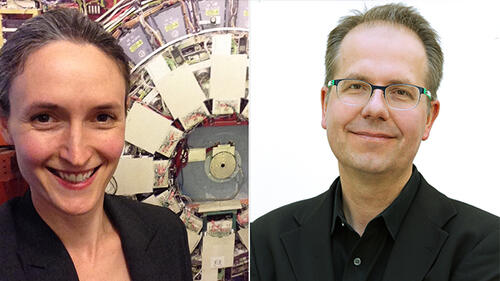
Karsten Heeger, Eugene Higgins Professor of Physics, director of the Yale Wright Laboratory (Wright Lab), and chair of the Yale Physics Department, is the deputy chair of the new Particle Physics Project Prioritization Panel (P5) that will set a vision for US particle physics for the next decade and beyond.
P5 is charged to propose a budget-constrained agenda for the U.S. Department of Energy (DOE) and the National Science Foundation (NSF) to pursue over the next decade, along with an even longer-term strategy for the field. Heeger will lead P5 along with P5 chair Hitoshi Murayama, a theoretical physicist from the University of California, Berkeley. Sarah Demers, professor of physics a leading particle physicist on the ATLAS and Mu2e experiments, and a member of Wright Lab, is a panel member. The last P5 process was completed in 2014.
The P5 committee received its charge in December 2022 through the High Energy Physics Advisory Panel (HEPAP), and is expected to deliver the final P5 report by October 2023. HEPAP advises the U.S. federal government on the national program in experimental and theoretical high energy physics (HEP) research and is a joint effort between the DOE and NSF.
This past week, the committee held its first town hall at Berkeley Lab to solicit input from the community and survey experiments at the cosmic frontier. Laura Newburgh, assistant professor of physics and a member of Wright Lab, was one of the featured speakers.
A key input to the P5 process will be the report from the recent “Snowmass” community study, distilling ideas presented by the particle physics community.
According to P5 chair Murayama, key elements of a successful P5 will be that it is well informed by the science community; sets a grand long-range vision for U.S. particle physics; faces budget constraints realistically; has a balanced portfolio; takes into consideration the evolving national and international context in the field; thoughtfully considers matters of diversity, equity, and inclusion; and involves community engagement.
The particle physics community is undertaking a broad and ambitious research program, from the study of neutrinos to testing fundamental interactions at the highest energies, to mapping the expansion of the Universe. In accordance with the national scene, Wright Lab and the Yale Physics Department are leading a variety of research efforts in investigating the full breadth of the field of experimental and theoretical high energy physics.
“Prioritizing the excellent ideas of the community and developing a strategic vision for the field is a daunting task,” Heeger said. “Enabling this fantastic science will be rewarding,” he added.
Demers said, “It’s fantastic to see Yale’s sustained involvement in P5. With Yale professor of physics Charlie Baltay chairing the 2008 committee and two faculty from Yale on the previous panel, which occurred in 2013, our department has had the privilege to help chart the path of particle physics in the United States over the past few decades and into the future.”
This article is taken from the Wright Lab News article of March 3, 2023, written by Victoria Misenti.